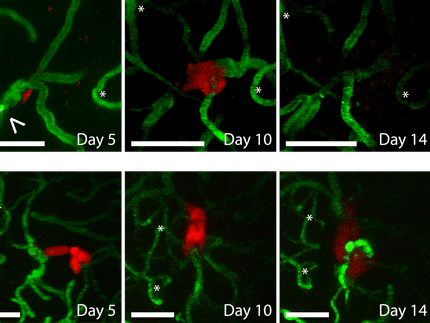Cancerous tumours: how likely are they to metastasise?
A very aggressive type of cancer has provided a team of researchers with an answer to the question of which tumour cells are at risk of spreading.

Symbolic image
Unsplash
Cancer treatment is sometimes complicated by the heterogeneity of the cells that form the tumour mass. The problem is how to identify the few cells that are capable of triggering metastases. Thanks to work carried out by a team of researchers supported by the Swiss National Science Foundation (SNSF), we now have a better understanding of how metastases form and which cells to target in therapy.
The researchers have succeeded in identifying and characterizing the most dangerous cells in Ewing’s sarcoma, a very aggressive bone cancer with high potential for spread that primarily affects children and young adults. In particular, among the very active genes of these cells the team pinpointed a gene known to be associated with a poor prognosis. More specifically, this gene promotes the diffusion of cancer cells and the formation of metastases.
The finding constitutes a first step towards the development of more targeted treatments, says Ivan Stamenkovic, professor of experimental pathology at the University Hospital Lausanne (CHUV) and co-author of the paper along with assistant professor Nicolo Riggi, also at CHUV. "Identifying the gene associated with the risk of metastases opens new avenues for research. The protein corresponding to this gene could be used as a potential therapeutic target in eliminating these very aggressive cells," says Stamenkovic.
Telltale glow
To achieve this result, the scientists first had to isolate the cells that form metastases. They took tumours from patients and grew them in conditions that mimic those of the human body to create organoids, i.e. tumour models. The researchers were then able to genetically modify the tumour cells by adding a gene that causes them to express a green fluorescent protein. This gene has been modified so that it can be suppressed by a very small RNA molecule (called microRNA) produced by the cells themselves. Because the cells that form metastases produce very little of this microRNA, they continue to express fluorescent protein. As a result, they appear bright and can be identified by their fluorescent colour. "It’s a tool that could be used in other types of tumours to understand the nature of aggressive cells," says Riggi.
Cancer cells are more tolerant
Ivan Stamenkovic’s research project focuses on the mechanisms responsible for the formation and development of cancers. "In most cancers," says Stamenkovic, "the cells that spread are those that have retained certain properties of stem cells, unlike most of the cells that constitute the tumour mass. These stem-like cells, which are called upon to regenerate tissues, must be able to retain a high degree of flexibility. As a result, they are more tolerant of events such as genetic mutations, and thus more likely to transform into cancerous cells because their defences are partially or totally suppressed."
Original publication
T. Keskin, B. Rucci, S. Cornaz-Buros, P. Martin, C. Fusco, L. Broye, K. Cisarova, I. Letovanec, S. La Rosa, S. Cherix, M. Diezi, R. Renella, P. Provero, I. Stamenkovic und N. Riggi; "A live single-cell state reporter assay links intra-tumor heterogeneity to metastatic proclivity in Ewing sarcoma"; Science Advances; 2021
Original publication
T. Keskin, B. Rucci, S. Cornaz-Buros, P. Martin, C. Fusco, L. Broye, K. Cisarova, I. Letovanec, S. La Rosa, S. Cherix, M. Diezi, R. Renella, P. Provero, I. Stamenkovic und N. Riggi; "A live single-cell state reporter assay links intra-tumor heterogeneity to metastatic proclivity in Ewing sarcoma"; Science Advances; 2021
Organizations
Other news from the department science

Get the life science industry in your inbox
By submitting this form you agree that LUMITOS AG will send you the newsletter(s) selected above by email. Your data will not be passed on to third parties. Your data will be stored and processed in accordance with our data protection regulations. LUMITOS may contact you by email for the purpose of advertising or market and opinion surveys. You can revoke your consent at any time without giving reasons to LUMITOS AG, Ernst-Augustin-Str. 2, 12489 Berlin, Germany or by e-mail at revoke@lumitos.com with effect for the future. In addition, each email contains a link to unsubscribe from the corresponding newsletter.



















































